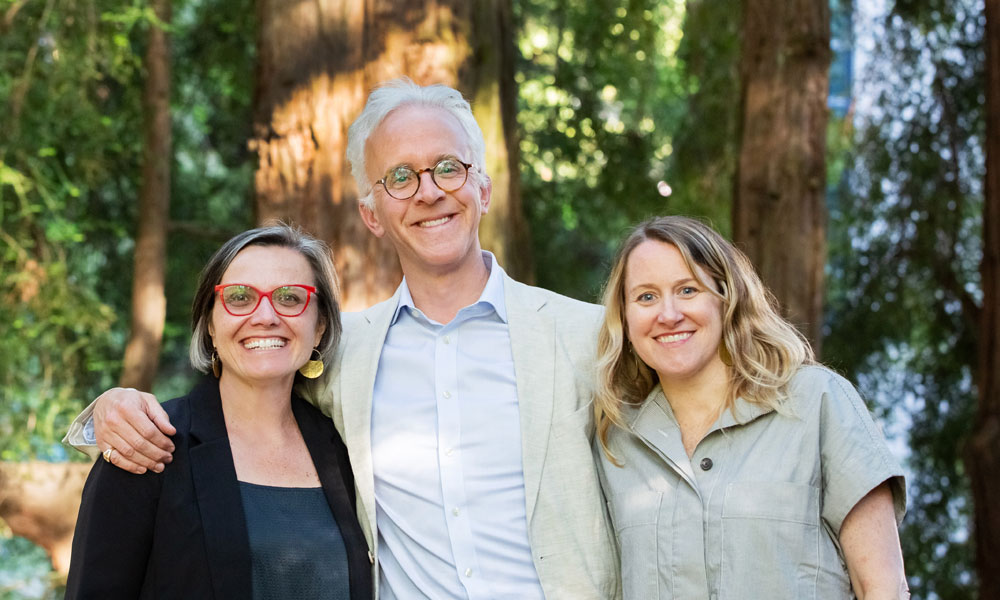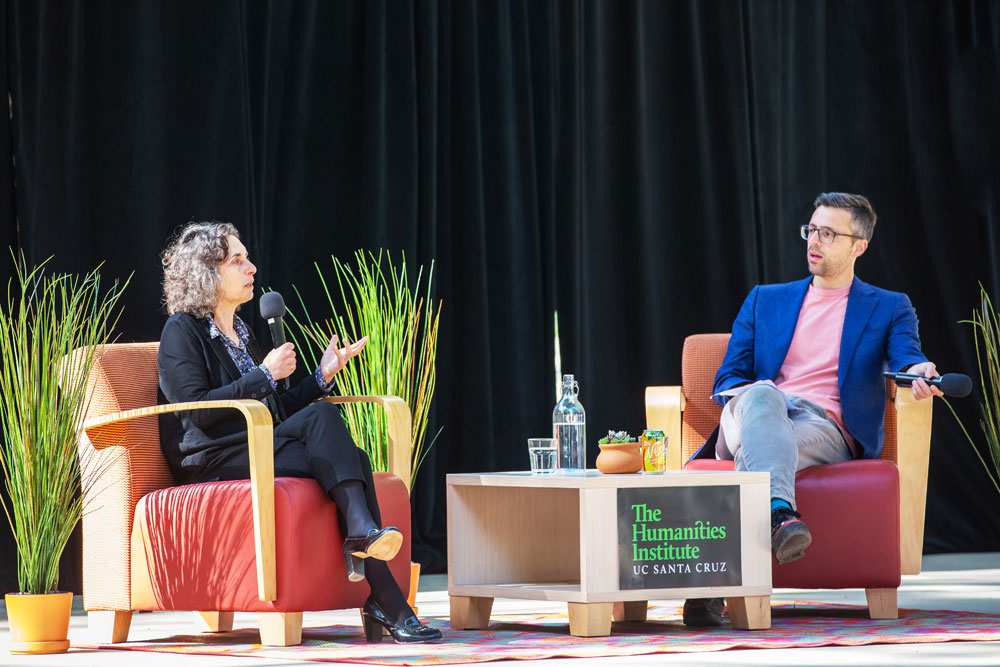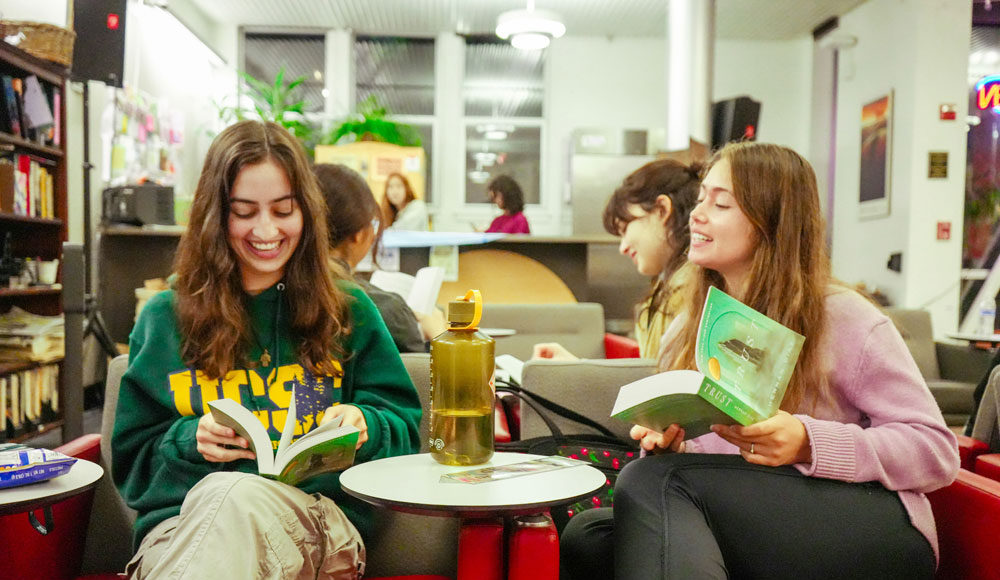Anyone in the word game, from writers to editors to publishers to professors of literature, knows that collectively we have one hell of a huge problem on our hands. The books we love, the books we view as a foundational requirement of a life well lived, they are basically in the crosshairs. People read less. When they do read, their attention spans are shorter. The books they do read are more often “content” to be skimmed and processed, nothing to be confused with literature.
It’s a full-fledged crisis and people who care deeply about books and book-reading have to take creative action to get people reading, which is just what the good people of the UC Santa Cruz Humanities Institute have done by launching a “Deep Read” program now in its fifth year.
Think of it this way: If reading a book is good, and reading a book together with a few others in a reading group is great, then a super-reading-group of thousands of others, bolstered by the expertise of UC Santa Cruz experts on various subjects all reading the same text at the same time, amounts to more like a potentially life-changing epiphany.
That at least is the hope, especially as participation has climbed from 3,874 the first year (featured author: Margaret Atwood) to 6,135 in 2021 (Tommy Orange), to 7,035 in 2022 (Yaa Gyasi), to 8,544 last year with Elizabeth Kolbert—and, as of last week, 9,576 and growing for this year.
“People often ask if the Deep Read is ‘just one giant book club’—we have almost 10,000 deep readers now—and in some way, yes, it is, but it is so much more!” Irena Polić, a co-founder of the program, told me via email.
“We designed it from the very beginning to be a place for the community to gather and read together, but also to use this amazing resource we have in our community, the University of California, to be able to enter a work of art through various perspectives. … All of the faculty are doing a deep read of the book with us and coming together for a conversation. That’s the unusual piece: bringing together different perspectives and taking the time to really delve into something deeply, and slowly, two things we are missing dearly in our political and cultural discourse today.”

This year’s phalanx of discussions and online considerations culminates with a live Santa Cruz appearance by this year’s featured author, Hernan Diaz, a genuine star in the literary world whose novel Trust won the 2023 Pulitzer Prize for Fiction and hit many best-books-of-the-year lists.
Diaz will talk about his novel at Kaiser Permanente Arena on Sunday, May 19, in conversation with Zac Zimmer, a UC Santa Cruz associate professor of literature. (The event, which is free, starts at 4pm.) Anyone interested can sign up to take part in the online discussions—thi.ucsc.edu/deepread—or attend the in-person discussion with Diaz.
Really, if you take a step back and think about it, people like Irena Polić and Program Manager Laura Martin are heroes, pushing the boundaries to try to unite town and gown in a larger community of engaged minds.
“I’m from Croatia originally, but Santa Cruz has been my home for decades and I have dedicated my work at the Humanities Institute for the past 15 years to breaking down any barriers that exist between the university and the community, real or perceived,” Polić told me.
“The whole town/gown distinction is silly—there is no UCSC without Santa Cruz, and Santa Cruz is such an amazing, dynamic and interesting place to live in large part because of the university.”
Martin, who came to Santa Cruz to study literature and never left, spends countless hours thinking about every aspect of the program, and always trying to stretch her mind to do more with it.
Take the book giveaway aspect of the program. More than 1,000 books are purchased from Bookshop Santa Cruz and distributed for free, some to the community, but primarily to UC Santa Cruz students and some area high school and community college students.
“Any student can have a free book, basically,” Martin told me. She freely admits she was slow to warm to the idea of giving away the books, but came around.
“That’s a big part of what Irena wanted to do, and I’ve been convinced,” she said. “It’s a big draw, and a big part of the program. We can tell authors: It’s not just an event, it’s book sales for them as well—and that matters to them more than the fee they get.”

Martin, who earned her PhD at UCSC, focusing on portrayals of indentured servitude and slavery in 17th- and 18th-century novels, hopes to continue to expand the program through more partnerships, for example at Cabrillo College and other community colleges. She also teaches a class each year on the Deep Read choice, a seminar she’s currently teaching with 18 students, running through next month.
“Thinking about it more as a public program, a campus-supported public program, is sort of the goal,” she said. “But we don’t want to lose the academic character of what we do. We’re trying to highlight our faculty’s research and interests and help them speak.
We’re trying to bridge town and gown, so we want to keep choosing books that we think are engaging and important and raise topics that we think people should think about, often complex ones, and help people do that. We want to be accessible but also challenging. Hitting the right balance is key.”
This year’s reading selection, “Trust,” checking in at more than 400 pages, might not be for everyone, but as someone who has been reviewing novels for quite a few years now, I’d confidently assert it’s a great novel—ambitious, packed with writing of precision and incantatory power.
Critics gushed over the clever four-part construction of the book, which builds and feeds on itself in surprising ways (not to give away too much). The first part is a novella by a fictional novelist, telling the story of an early-20th-century financier and his patron-of-the-arts wife; the second features sections of an incomplete autobiography in the voice of the financier whose life was appropriated for the novella; the third tells the story of the woman asked to ghost-write that autobiography; and the fourth consists of fragmentary diary entries from the patron-of-the-arts wife of the financier, the less said about this diary the better.
I freely admit that, for me at least, it felt a bit like a chore getting through the first couple hundred pages, in which, from my point of view, the larger-than-life financier is presented less like an actual person, the way one might expect a novelist to want to portray his characters, and more like a moving billboard meant to inspire hisses and catcalls from we the reader. (Capitalism! Bad! Boo!)
Diaz, tipping his hand in one interview, talked of reading “manspreading” memoirs from the likes of industrialists Andrew Carnegie and Henry Ford for inspiration. (Diaz wants the reader to squirm through these sections, and in that sense I may have been his ideal reader, slogging through them stuck on a cross-country flight middle seat, wedged between two big dudes, one of whose “manspreading” was no wink-to-the-crowd cute metaphor.)
Finally, gloriously, by Book 3 beginning on page 193, we shift to “A Memoir, Remembered,” by Ida Partenza, and the story opens up in surprising ways and the clever structure starts to pay off in a way that moves beyond the underlying sense of being stuck inside an MFA proseminar on clever narrative techniques.
I loved the Ida character, right away, and I expect most readers join me on that. Scrapped for cash, living with her anarchist Italian-immigrant father, a typesetter, she applies for a job in a Wall Street office, with no idea what to expect. The next thing she knows she’s being handed an envelope containing ten crisp twenty-dollar bills: For her, at the time, an unimaginable fortune. (Her father and her paid twenty-five a month in rent, unpaid until the envelope arrived.)
“They were unused and clung to one another,” Ida (though actually Diaz) writes. “Wondering what the actual smell of money—rather than that of the multitude of hands that had touched it over the years—could be, I stuck my nose into the envelope. It smelled just like my father.
But beneath the ink there was also a forest-like scent. An undertone of damp soil and unknown weeds. As if the bills were the product of nature. … My father was right: money was a divine essence that could embody itself in any concrete manifestation.”
Book 3 is constructed from the vantage of many years later, looking back after Ida has gone on to a long career as a writer, and her importance to the book springs not only from her role as ghost-writer for the industrialist, trying but failing to persuade him to present his late wife, by then dead of cancer, in something like three dimensions, a brilliant force of nature with an agile mind and sublime taste in music and the arts. Instead, the wife of this narrative is reduced down to almost nothing, barely a person at all. But Ida herself finds an actual diary, kept by the actual wife, Mildred Bevel, snippets of which are presented in Book 4.
“I liked the form of the book, and I think I liked the experience of reading it: I read it blind,” Martin told me. “I didn’t pay much attention to any writing about the structure. I didn’t love it at first, it was kind of slow.
I liked the different pacing, and how it was sort of uncovered as you read. To me it was fun, reading almost like a detective looking for clues. It wouldn’t let you get immersed in it.”
It’s not too late to get involved with this group-reading project. Pick up the book at Bookshop Santa Cruz, or wherever, and read what you can before Diaz arrives. Sign up and follow online as the UCSC community shares different perspectives—including that of “Deep Read Scholars” Lori Kletzer of the economics department, Campus Provost and Executive Vice Chancellor, Madhavi Murty of Feminist Studies, and Dard Neuman of Music.
The project represents a rare opportunity for people in the community—and beyond—to work together, and I for one wish these organizers well in continuing to grow their following.
I’m reminded of a series of stories I did from Europe years ago for Wired.com in which I told of an online battle between Internet-artists based in Switzerland and a Southern California-based toy company; they were fighting over a URL, in an important early skirmish about whether the Internet would be more about commerce or about creativity.
“This is the Battle of Bull Run!” John Perry Barlow, best known for his work as a Grateful Dead lyricist, told me for one article. And it kind of was: etoy, the internet artists, versus etoy.com. Thanks in part to my efforts, flogging this story for Wired.com for weeks, the side of creativity won. Zai, one of the etoy guys, told me that etoy’s artistic project was all about multiplying “surface area.” Meaning the coverage I offered, and the huge audience it generated, was part of the art, part of the project. I’d gently suggest that Deep Read participants might want to think about that moving forward.
I can totally see why they chose the Diaz novel this year, even if in the end Trust strikes me as a novel about novel-writing as much as anything else, but I’ll offer a little constructive advice and encourage them to take next year’s pick in a more accessible direction. By then we’ll all be unpacking from the decisive year of 2024.
In fact, in the spirit of this being a broader community discussion, I’d like to nominate a book for next year: Small Acts of Courage: A Legacy of Endurance and the Fight for Democracy by Ali Velshi, known to many as an MSNBC anchor but also the grandson of Gandhi’s youngest student at Tolstoy Farms in South Africa. The book, which actually has a publication date of today, offers startlingly powerful background on the antecedents of the student protest movement we’ve seen sweeping the country in recent weeks.
“From childhood, Velshi’s grandfather was imbued with an ethos of public service and social justice, and a belief in absolute equality among all people―ideals that his children carried forward as they escaped apartheid, emigrating to Kenya and ultimately Canada and the United States,” the publisher, St. Martin’s, explains in its blurb. “In Small Acts of Courage, Velshi taps into 125 years of family history to advocate for social justice as a living, breathing experience―a way of life more than an ideology.”
That to me powerfully sums up what Irena Polić and Laura Martin and the many others at UCSC who have put so much heart and soul into the Deep Read program have in mind: Reading thought-providing books as a way of life and encouraging, through deep reading, and deep discussion of all the ideas and emotions the experience of reading can bring, a “living, breathing” commitment to social justice with a mentality that is generous and not exclusionary, open-minded and never intellectual one-upping.
I took the liberty of running the idea by Velshi, and he told me he’d be delighted to take part.
The free event has been moved from the campus to the Kaiser Permanente Arena Sunday, at 4pm.











